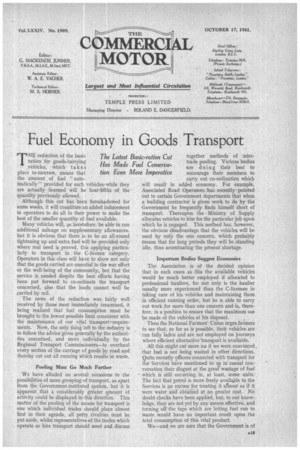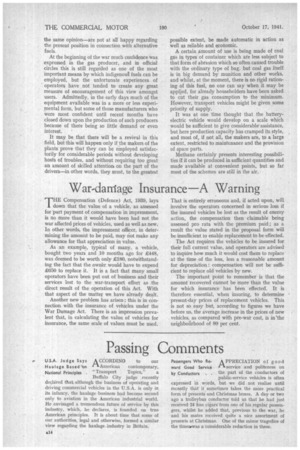Fuel Economy in Goods Transport
Page 15

Page 16

If you've noticed an error in this article please click here to report it so we can fix it.
E reduction of the basic ration for goods-carrying vehicles, which takes place to-morrow, means that the amount of fuel " automatically " provided for such vehicles-while they are actually licensed will be four-fifths of the quantity previously allowed.
Although this cut has. been foreshadowed for some weeks, it will constitute 'an added inducement to operators to do all in their power to make the best of the smaller quantity of fuel available.
Many vehicles will, as heretofore, be able to run additional mileage on supplementary allowances, but it is obvious that there is to be an all-round, tightening up and extra. fuel will be provided only where real need is proved, this applying particularly to transport in the C-licence category. Operators in this class will have to show not only that the goods carried are essential to the war effort or the well-being of the community, but that the service is needed despite the best efforts having been put forward to co-ordinate the transport concerned, also that the loads cannot well be parried by rail.
The news of the reduction was fairly well received by those most immediately concerned, it being realized that fuel consumption must be brought to the lowest possible. limit consistent vvith the maintenance of our vital transport.requiremerits. Now, the only thing left to the industry is to follow the advice 'given generally by the authorities concerned, and more individually by the Regional Transport Commissioners—to overhaul every section of the carriage of goods by road, and thereby cut out all running which results in waste.
Pooling Must Go Much Farther We have alluded on several occasions to the possibilities of more grouping of transport, as apart from the Government-instituted system, but it is apparent that a considerably greater amount •of activity could be displayed in this direction. This matter of the pooling of the means for transport is one which individual trades should place almost first in their agenda, all petty rivalries must be put aside, whilst representatives of the trades which operate or hire transport should meet and discuss together methods of intertrade pooling. Various bodies are doing their best to encourage their members to carry out co-ordination which will result in added economy. For example, Associated Road Operators has recently pointed out to certain Government departments that when a building contractor is given work to do by the Government he frequently finds himself short of transport. Thereupon the 'Ministry of Supply allocates vehicles to him for the particular job upon which he is engaged. This method has, however, the obvious disadvantage that the vehicles will be used by only the one concern, which probably means that for long periods they will be standing idle, thus accentuating 'the present shortage.
Important Bodies Suggest Economies The Association is of the decided opinion that in such cases as this the available vehicles would be much better employed if allocated to professional hauliers, for not only is the haulier usually more experienced than the C-licensee in taking care of his vehicles and Maintaining them in efficient running order, but he is able to carry out Work for more than one concern and is, therefore, in a position to ensure that the maximum use be made of the vehicles at his disposal.
Then the National Farmers' Union urges farmers to see that, so far as is possible, their vehicles are run fully laden and are not employed on journeys where efficient alternative transport is available.
All this might cut more ice if we were convinced that fuel is not being wasted in other directions. Quite recently officers connected with transport for the Services have mentioned to us in casual conversation their disgust at the great wastage of fuel which is still occurring in, at least, some units. The fact that petrol is more freely available to the Services is no excuse for treating it almost as if it were water and obfairied at no greater cost.. No doubt checks have been applied, but, to our know-. ledge, they are not yet by any means effective, and turning off-the taps which are letting fuel run to waste would have an important result upon the total consumption of this vital product We—and we are sure that the Government is of the same opinion—are pot at all happy regarding the present position in connection with alternative fuels.
At the beginning of the war much confidence was expressed, in the gas producer, and in official circles this is still regarded as one of the most important means by which indigenoug fuels can be employed, but the unfortunate experiences of operators have not tended to create any great measure of encouragement of this view amongst users. Admittedly, in the early days much of the equipment available was in a more or less experimental form, but some of those manufacturers who were most confident until recent months have closed down upon the production of such producers because of there being so little demand or even interest, It may be that there will be a revival in this field, but this will happen only if the makers of the plants prove that they can be employed satisfactorily for considerable periods without developing hosts of troubles, and without requiring too great an amount of skilled attentior . on the part of the drivers—in other words, they must, to the greatest possible extent, be made automatic in action as well as reliable and economic.
A certain amount of use is being made of coal gas in types of container which are less subject to that form of abrasion which so often caused trouble with the ordinary type of bag, but coal gas itself is in big demand by munition and other works, and whilst, at the moment, there is no rigid rationing of this fuel, no one can say when it may be applied, for already householders have been asked to cut their gas consumption to the minimum. However, transport vehicles might be given some priority of supply.
It was at one time thought that the batteryelectric vehicle would develop on a scale which would be sufficient to give considerable' assistance, but here production capacity has cramped its style, and most of, if not all, the makers are, to a large extent, restricted to maintenance and the provision of spare parts.
Methane certainly presents interesting possibilities if it can be produced in sufficient quantities and made available at convenient points, but so far most of the schemes are still in the air.




















































